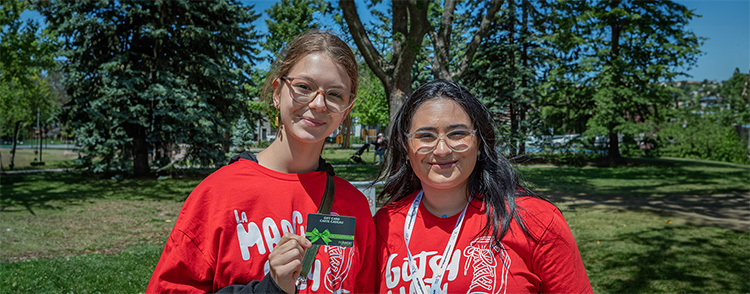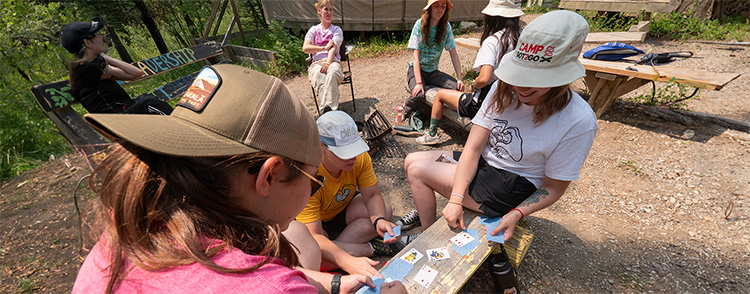Vol W Us FRE
Faites du bénévolat avec nous
Les bénévoles de Crohn et Colite Canada, en partenariat avec le personnel, font une différence dans la vie des personnes touchées par la maladie de Crohn ou la colite ulcéreuse. Les bénévoles font don de leur temps et de leurs talents, mettent leurs compétences professionnelles et personnelles au service de la sensibilisation, défendent des politiques publiques saines et contribuent à recueillir des fonds afin que Crohn et Colite Canada puisse continuer à financer des recherches cruciales et des programmes qui changent la vie des patients. Nous savons que le temps est précieux et sommes très reconnaissants envers toutes les personnes qui choisissent d’en faire don pour faire du bénévolat à Crohn et Colite Canada. Toute une gamme d’occasions de bénévolat vous est proposée, notamment des postes et des occasions à court et à long terme en personne, virtuels et hybrides.
Pour toute question, veuillez contacter l’équipe de l’engagement des bénévoles à volunteer...crohnsandcolitis...ca. Vous trouverez plus de renseignements sur les occasions de bénévolat en cours, ou vous pourrez soumettre votre demande ici :
Voici les domaines d’impact des bénévoles à Crohn et Colite Canada :

Défense et sensibilisation
En tant qu’organisme de bienfaisance de premier plan dans le domaine de la santé au Canada et plus grand organisme de bienfaisance qui se consacre à la maladie de Crohn et à la colite ulcéreuse, Crohn et Colite Canada a pour mandat de sensibiliser, d’informer et de défendre les intérêts d’un Canadien sur 140 qui vit actuellement avec une maladie inflammatoire de l’intestin. Les bénévoles jouent un rôle clé : ils diffusent des informations à jour sur des sujets liés à la santé, ils participent à des salons consacrés à la santé et ils plaident en faveur d’une politique publique saine, et cela par l’entremise de programmes tels que notre programme d’accès aux toilettes AllezIci, en illuminant les monuments locaux à l’occasion du Mois de la sensibilisation à la maladie de Crohn et à la colite en novembre, ou en soutenant nos activités nationales.
Découvrez-en plus sur les Défense et sensibilisation.

Engagement communautaire et collecte de fonds
Des bénévoles de partout au Canada interagissent avec la communauté des personnes touchées par les MII et au-delà pour contribuer à promouvoir la mission de Crohn et Colite Canada et à recueillir des fonds afin de trouver un remède contre ces maladies. Les bénévoles qui s’investissent dans l’engagement communautaire et les collectes de fonds ont diverses responsabilités; elles vont de l’aide à la planification et à la réalisation d’événements virtuels et en personne tout au long de l’année, y compris la Marche Gutsy, en passant par le soutien le jour de l’événement, la promotion de programmes pour les patients et le soutien de campagnes de sensibilisation et de défense des intérêts.
Découvrez-en plus sur les régions et les sections ici.

La Marche Gutsy
La Marche Gutsy est le principal événement de collecte de fonds de Crohn et Colite Canada; elle est organisée partout au pays. Il s’agit d’une façon amusante et familiale pour les bénévoles de contribuer à recueillir des fonds pour la recherche visant à trouver un remède contre la maladie de Crohn et la colite ulcéreuse. Les bénévoles de la Marche Gutsy jouent un rôle essentiel en partenariat avec le personnel et les partenaires communautaires dans la planification et la réalisation d’événements en personne et virtuels partout au Canada. La Marche a lieu le premier dimanche de juin de chaque année.
Visitez le gutsyenmarche.ca pour plus d’information.

Programmes pour les patients
Les programmes destinés aux patients de Crohn et Colite Canada visent à améliorer la qualité de vie des personnes touchées par une MII. Les bénévoles jouent un rôle clé dans l’offre d’un certain nombre de programmes, notamment le Camp Got2Go, le programme de soutien par les pairs Entraide Gutsy pour les patients et les proches aidants, mais aussi Crohn et Colite Connect.
Avez-vous des questions
Si vous avez des questions, écrivez-nous à l’adresse électronique volunteer...crohnsandcolitis...ca
Appliquer maintenant